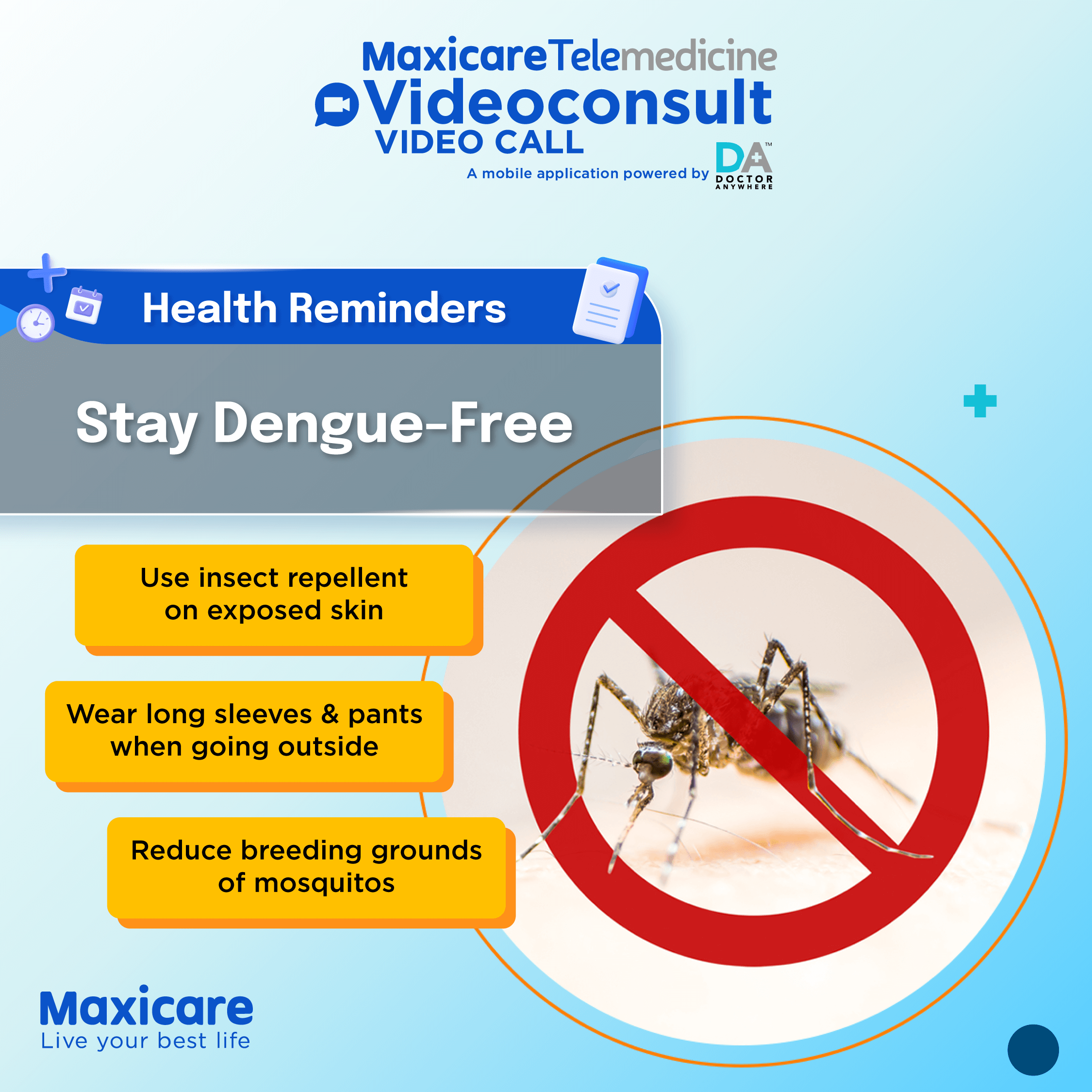
The rainy season brings with it the threat of Dengue, a mosquito-borne illness that can lead to symptoms like fever, headache, muscle pain, and rash. In some serious cases, it can be life-threatening.
When it comes to dengue, there’s no specific treatment available. Typically, those who contract the virus receive care focused on managing their symptoms, getting plenty of rest, and staying hydrated with fluids. The best way to deal with dengue is to prevent it altogether.
To help you steer clear of dengue this rainy season, here are three handy tips to remember:
TIP #1 – Repel mosquitos
The main vector of dengue is the aedes genus of mosquitos. Therefore, a simple and effective method to prevent dengue is by taking measures to repel mosquitoes from yourself and your living environment.
Insect repellent applied on the skin is one way to do this. Make sure to apply insect repellent to any exposed skin, and remember to reapply if you’ll be outdoors for an extended period. If you plan to use any products on your children, we strongly recommend consulting a doctor beforehand.
Using insecticides to control the population of insects inside your home is also effective. Consider picking insecticides that are safe for humans and animals.
You can also opt to use electronic mosquito-repelling devices to keep insects away from you while you sleep. If you prefer to use mosquito coils to achieve the same effect, you may do so at your discretion; just make sure to fireproof the location of the coil.
TIP #2 – Cover up!
Covering up is helpful because it reduces the amount of contact mosquitos will have with you. For example: when you’re heading outdoors, you may choose to wear long-sleeved shirts, pants, and socks to cover up your external appendages. This will help protect you from mosquito bites.
Installing screens on your windows and a screen door in your doorway can also help prevent insects from coming into your home. Most of the time, insects come from outside the home, and while you can’t always prevent them from getting inside, this can be an effective preventive measure.
Another preventive measure you can take is to install mosquito netting in sleeping areas. This is especially useful in the sleeping areas of children and babies, as topical insect repellents are generally not advisable for young children.
TIP #3 – Reduce breeding grounds
The aedes mosquitos breed the same way as other mosquitoes – in areas that accumulate water. Mosquitoes can breed in as little as an ounce of stagnant water, and the shallower the water, the better it is for them.
Be sure to check your surroundings for any water accumulation in areas like flower pots, open containers, and clogged gutters. Take proactive steps by either emptying and covering or treating these spots to prevent mosquito breeding.
You can treat areas that will accumulate water no matter what by covering them whenever you can, or by putting some dish soap or oil in them. This will prevent mosquitoes from surviving past the wriggler stage of their life cycle.
But the better option is to prevent the possibility of water accumulation. Anything that can accumulate water – old tires or storage containers indoors – needs to be emptied or covered to eliminate the possibility of becoming a breeding ground for mosquitoes.
By following these tips, you can ensure the safety of both yourself and your loved ones from dengue. And if you or anyone you know is exhibiting any dengue-related symptoms, it’s crucial to promptly seek medical attention. You can immediately connect with a doctor and get your laboratory tests done at Maxicare’s Primary Care Clinics. You may also immediately consult a doctor via the 24/7 Teleconsult Hotline or its Videoconsult services powered by the Doctor Anywhere app. If you’re in Metro Manila or select provinces, you can access Maxicare’s HomeCare medical procedures.
References:
https://mmda.gov.ph/faq/20-faq/5479-dengue-prevention-guide-faq-updated-june-7-2022.html
https://www.unilab.com.ph/articles/how-to-prevent-dengue












